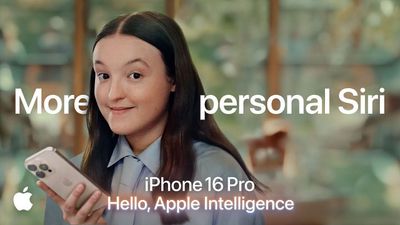Apple has been hit with at least two more proposed class action lawsuits over its delayed personalized Siri features for iPhones.

In the U.S., a complaint filed in a California federal court this week alleges that Apple violated false advertising and unfair competition laws by marketing Apple Intelligence upgrades for Siri that are still not available. The two named plaintiffs said they never would have purchased or been willing to pay as much for an iPhone 16 had they known that Apple's marketing surrounding the features was false and misleading.
Apple advertised the Siri features in product presentations, on its website, in a TV commercial starring actor Bella Ramsey, and elsewhere.
Apple was already sued over the delayed Siri features in California last month, and the class action lawsuits could eventually be merged if they proceed.
A similar complaint was filed against Apple last week in the Canadian province of British Columbia.
Apple first previewed the personalized Siri features during its WWDC 2024 keynote last June, as part of a wide range of Apple Intelligence features that it said would be rolling out over the course of the following year. That gave Apple until WWDC 2025 this June to roll out the Siri features, but last month the company announced that it needed more time and anticipated rolling out the features at some point "in the coming year" from then.
The features were initially expected to launch in iOS 18.4 last week, but they are now expected to arrive at some point during the iOS 19 cycle. Many well-connected Apple reporters and observers believe the features will not be available until 2026.
Whenever they launch, the Siri upgrades will include understanding of a user's personal context, on-screen awareness, and deeper per-app controls. For example, during its WWDC 2024 keynote, Apple showed an iPhone user asking Siri about their mother's flight and lunch reservation plans based on info from the Mail and Messages apps.
The class action lawsuits in the U.S. and Canada are both seeking damages from Apple, in an amount to be proven at trial, so class members who purchased an iPhone 16 in order to use the personalized Siri features could eventually receive a payout from Apple, if the judges presiding over each case find that the company broke the law.
Apple's lawyers have yet to respond to any of the lawsuits.





















